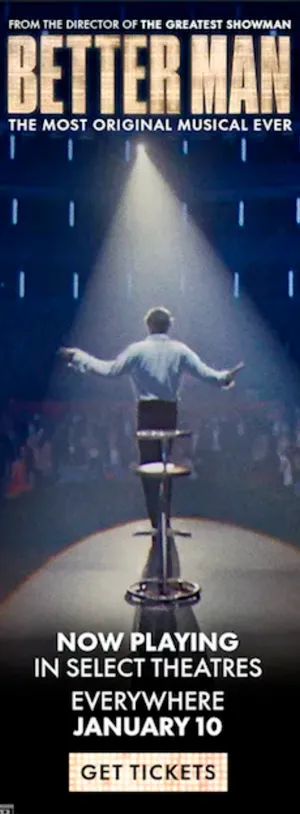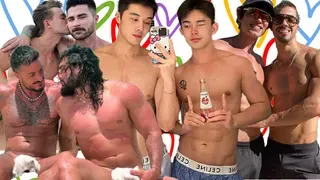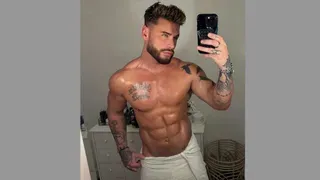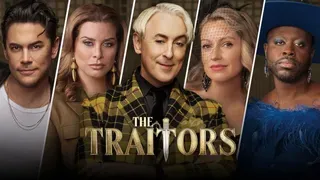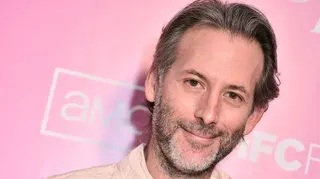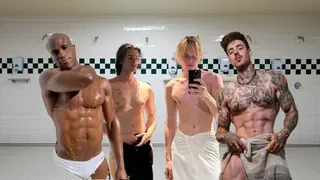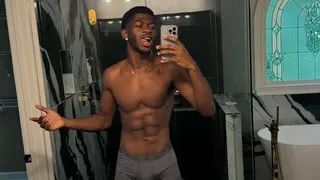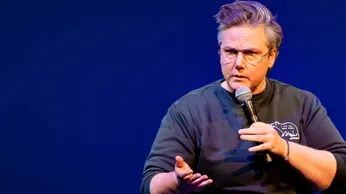
September 4, 2024
'I'm a Disrupter,' Says Hannah Gadsby as They Set Out to Tour 'Woof'
Nicholas Dussault READ TIME: 8 MIN.
When Hannah Gadsby (them, they) went to the Edinburgh Fringe Festival in 2017 to record their Netflix comedy special "Hannah Gadsby: Nanette," they were already a popular comic on the festival circuit, albeit a "lesbian heavy" niche one. But after the special's release the following year, their career skyrocketed. Overnight they became an Emmy-winning star with legions of fans, throngs of detractors, and more attention than they ever thought possible.
It was all too much for the lesbian comic who hailed from Tasmania, a place where gay people were told to "get yourself a one-way ticket to the mainland and never come back." (The mainland being Australia.) Gadsby's brilliant show decimated the patriarchy while uniting the bullied, the outcasts, the genderqueers – essentially anyone who'd ever been the punchline. It remains a blistering analysis of comedy smartly interwoven with art history, which was the comic's college major.
Gadsby also gave the audience some insight into what it's like to receive a diagnosis of ADD and autism spectrum disorder, and how to live with it. There was also their trauma, manifested in anger, rage, pain, and, yes, laughter. But it was a different kind of laughter in a different type of comedy special. Sure, the audience laughed, identified, and felt a sense of validation for their own feelings; but the special had a life of its own, receiving outsized media attention for its star and subject. Gadsby even became embroiled in a highly publicized dustup with a Netflix executive that earned them the wrath of Dave Chappelle's fandom, which became the subject of their recent show, "Hannah Gadsby's Gender Agenda."
The ascent to stardom changed everything for Gadsby. They now had a platform and an audience that included celebs like Jodie Foster (who even brought the a birthday gift of Bananagrams, which they turned down). But the emotional toll that "Nanette" took on Hannah was palpable, and they realized they could never could perform it again. Nonetheless, they continue to perform, to grow, to challenge, and, yes, to entertain.
Their latest show, "Woof!" is coming to Boston's Emerson Colonial Theatre for two shows on September 19. According to the New York Times' review, Gadsby skewers Taylor Swift, gets real about the sex lives of lesbian soccer players, and even calls social media the place "where neurotypical people go to experience the world of autism."
Recently EDGE had the chance to chat with Hannah Gadsby while they were performing at Edinburgh, the place it all began.

Source: Ian Laidlaw
EDGE: Thanks to Netflix, "Nanette" turned you into a huge star in 2018, but you certainly weren't an overnight sensation. You've been a working comic since 2006.
Hannah Gadsby: I think it's a common thing, this decades-long overnight success. It was a very odd thing, this very singular thing that I created in a very special festival bubble. It was a show written for audiences who knew me. And Netflix ripped it out of context for people who don't know me. For people who know my work, it's a touchstone. "Nanette" is an anomaly. I'm a storyteller. I always used my work to work out my own stuff. I've always mined my life for these dark little stories.
"Nanette" really wasn't a story show. I couldn't have done that show first. It was very much a show in sequence. It hasn't changed what I do. It's my life's work to understand myself and my place in the world. What happened with "Nanette" was this singular thing that I don't think will ever happen again, because the landscape has changed. It was part of a moment, but I wasn't responsible for the moment.
It wasn't a cynical exercise to me. I was at the point in my personal and public work that I was deeply frustrated. It was an eviscerating trauma, and at the end there was nothing left of me. It's taken me quite a long time to recover and to understand this new landscape. My mind was blown totally.
EDGE: Did you ever think that your career was going to explode like that?
Hannah Gadsby: I don't think I can ever be accused of being overly ambitious. In my life, I'm lazy. Being famous is possible, but it's a lot of work, and I'm averse to that. I wasn't planning to be this. I've gotten the kind of success most comics dream of, but I'm not most comics. I'm not American. I married an American. Australia and America have very different ambition thresholds. Even in Australia I'm quite laconic. I like to aim for achievable things, and stardom was never one of them. It's a lot of paperwork, the visas and all.
EDGE: How much of your material comes from your family?
Hannah Gadsby: I used to mine my family for all my stories, but I was only talking to one [comedy] room at a time. It's a different thing now. We're a quiet family, living a quiet life. Though, my mom was in a restaurant near a venue I performed in, and people were talking about their tickets and she said to them, "I got a free ticket because I'm her mother." First time she experienced that sort of fan situation, and she kind of loved it.
I'm very close with my family. "Nanette" was hard for all of us, but they were with me all the way through. I felt very grounded and privileged to have them. My family anchored me through it all. They are real human beings. I don't want to put real people into my stories
EDGE: Do you still consider yourself a comic?
Hannah Gadsby: Comedy is a regressive concept. As you get older, there isn't as much desperation to make people laugh. It's time to grow up a bit. It's good, but you get to a place where you either want to continue to be a comic or grow the fuck up. Comedy is such an isolating industry. Helping people is much more fun than competing with them.
EDGE: Do you feel like you help people with your work?
Hannah Gadsby: I don't know. I'd like to think so. I spent my post-"Nanette" years just trying to stabilize myself, because it was whiplash for me. I feel a bit more steady now. Being a star is not the point. Doing the work is enriching. Finding the audience. Comedy is special for people who aren't wealthy and aren't connected. They're the most exciting audiences, not people who have access to theater and television. Comedy and music are where they are.
